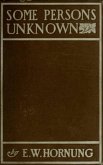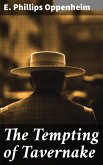In "Some Persons Unknown," E. W. Hornung masterfully weaves a narrative that delves into the complexities of identity and morality amidst the backdrop of a gripping mystery. The novel is characterized by Hornung's keen observation and an intricate plot that reflects the societal tensions of Victorian England, particularly the exploration of justice and the ambiguity of guilt. Through a combination of vivid characterizations and a suspenseful pace, Hornung's literary style is both engaging and thought-provoking, encouraging readers to question the nature of truth and the facades people uphold. E. W. Hornung, known for his creation of the beloved character A.J. Raffles, brought a unique perspective to the mystery genre, informed by his background in literature and a keen interest in the interplay of ethics and crime. His experiences and reflections on societal norms likely influenced the themes within "Some Persons Unknown," allowing him to explore the darker aspects of human nature and the moral dilemmas inherent in the pursuit of justice. Hornung's literary career, including his successful writing partnership with his wife, Helen, adds layers of depth to his oeuvre. Readers who appreciate finely crafted mysteries that probe the gray areas of morality will find "Some Persons Unknown" an essential addition to their literary repertoire. This novel is not just a thriller; it is a profound examination of personal and societal ethics that resonates with contemporary audiences. Enthusiasts of Victorian literature and mystery alike will find Hornung's insights compelling and his storytelling unparalleled.
Dieser Download kann aus rechtlichen Gründen nur mit Rechnungsadresse in A, B, BG, CY, CZ, D, DK, EW, E, FIN, F, GR, H, IRL, I, LT, L, LR, M, NL, PL, P, R, S, SLO, SK ausgeliefert werden.









